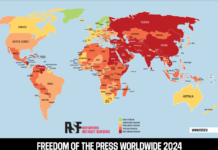Human rights issues, including press freedom, in Turkey must not be held hostage to geopolitical developments, and the international community must step up its efforts to bring Turkey back into the club of countries that respect the rule of law, said the International Press Institute (IPI) in its report “Turkey’s Journalists on the Ropes,” which was published today.
“The government is determined to use all available tools to suppress criticism whether on broadcasters, in print and online,” IPI head of Europe Advocacy Oliver Money-Kyrle said in a press release announcing the report. “The international community and the European Union, in particular, must be prepared to make improved relations contingent on an end to the media crackdown and improved human rights in general.”
The report examines the threat of extensive censorship of the Internet posed by the Social Media Law, which came into force on October 1; the political capture of media regulatory bodies and how they are used to muzzle public debate and critical journalism; and the ongoing crisis of judicial independence.
It is the product of a joint mission to Turkey on October 6 to 9, 2020 of 11 international freedom of expression, journalists and human rights organizations. Members of the mission met with media professionals, civil society actors, judicial and regulatory authorities, members of parliament and representatives of diplomatic missions for the purpose of reviewing the status of media freedom in the country.
According to the report, the arrests of journalists continue to be of great concern. Since the beginning of 2020, at least 22 journalists have been arrested, some of whom have been released while investigations into them continue. As of November 2020, at least 130 hearings involving journalists as defendants had been held this year. Citing monthly press reports of Gazete Karınca, the report states that at least 30 new investigations or lawsuits were opened against journalists in the first eight months of 2020.
Hundreds more continue to face prosecution and travel bans in the face of a compromised judiciary that denies journalists the right to a fair trial, the report says. The number of jailed and prosecuted journalists fell partly as a result of the conclusion of cases opened in the aftermath of a failed coup in July 2016. The decline is also attributed to the success of the Turkish government in muzzling the media.
Yet, journalists from across the media spectrum continue to face arrest and prosecution over their coverage of issues sensitive to the government, such as military operations, economic decline and issues facing Kurds and other minority groups in Turkey. Coverage of the COVID-19 pandemic was also added to the list this year as IPI recorded 13 incidents between March and August in which journalists were detained, investigated or faced systematic violations of their rights while reporting on COVID-19 cases.
According to the report, while the situation in the courts remains critical, with up to 79 journalists currently in prison, the last year has seen the battleground over freedom of expression shift from the courtroom to the regulators. The Turkish government is increasingly choking freedom of expression in the country through regulators who have ramped up their punishments for the print and broadcast media.
With their extensive powers to grant and remove licenses and impose financial penalties, regulators are able to force independent media to either comply or risk closure, the report said. “This strategy is expected to ensure media self-censorship so the intervention of the courts becomes less necessary and less frequent.”
The delegation called for an end to the misuse of state regulatory bodies, including the Radio and Television High Council (RTÜK) and the Press Advertising Authority (BİK), to punish and financially cripple independent media. The report underlined that RTÜK has stepped up a campaign of fines and broadcast bans on independent television broadcasters.
According to the report, the Social Media Law, which came into force on October 1, poses an immediate threat of extensive censorship of the Internet. This is particularly worrisome — following the state-led takeover of mainstream media – for social media platforms as well as online news sites, among the last bastions of critical journalism in Turkey.
The report was prepared by IPI with the support of the Association of European Journalists (AEJ), the Committee to Protect Journalists (CPJ), the European Centre for Press and Media Freedom (ECPMF), the European Federation of Journalists (EFJ), Osservatorio Balcani Caucaso Transeuropa (OBCT), PEN International, Reporters without Borders (RSF) and the South East Europe Media Organisation (SEEMO).

















[…] “Meanwhile, in its October 2 statement, the Council of the European Union offered to improve economic relations with Turkey without mentioning Turkey’s human rights record,” the IBI also said. Indicated. […]